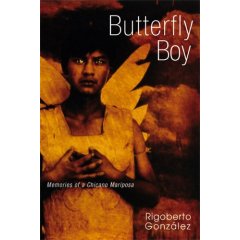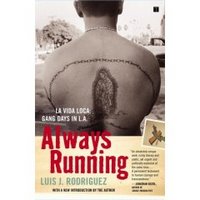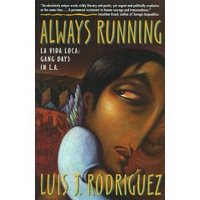
KCAL 9 News about last Friday's vigil for José J. García
News story: (in the video portion of this other news story about the murder, I'm sad to report that José is erroneously called "Juan")
The following comes from Adriana Alexander, a community activist in my hometown Santa Ana, California. I met Adriana at the Border Book Festival in Las Cruces, NM, this spring and she and I have kept in touch. Please read on about the tragedy surrounding the murder of José J. García, one of Adriana's students. My heart goes out to José's family and friends, and I am deeply saddened to hear about the brutality surrounding his death. Adriana's words help raise awareness about tragic events that happen to immigrants in the U.S., stories we often hear about only briefly in the news. Thank you for sending this my way, Adriana.
Death of José J. García
Written Saturday, Nov. 18th, 2006, by Adriana Alexander
The last time that I saw my ESL student, José, was the Sunday before he was killed. I was tutoring at the Centro Cultural in Santa Ana, where my mother and I had started a program to help adult immigrant ESL students in Santa Ana succeed in their studies. José faithfully attended our classes every week to practice his English. But today, José wasn’t at the Centro for English lessons; he was attending dance classes just down the hall, learning the intricacies of cumbia and danzón. José loved dance class, and he often cajoled me into dancing a few minutes with him on those Sunday mornings. I didn’t mind. As José left the Centro that Sunday, in a hurry to go home and cook his big meal which he would eat all week, he stuck his head into our class to wave good-bye. He made a point of getting my attention and saying, “Bye, Adriana.” I looked up, smiled and waved, thinking that I would see him again later that week. In fact, there were a number of people who were really looking forward to seeing José on that coming Friday, when our whole class plus friends and supporters were going to hold a mini cumbia dance party, with José presiding as our dance expert.
Early the next morning, on Monday, November the 13th, José de Jesús García Ramos, age 34, was brutally murdered as he walked from the bus stop to the graveyard shift at the factory where he worked doing medical laundry. Three unknown assailants attacked José; he was robbed, beaten, run over, and left for dead.
I knew José as a bright and dedicated student who made us smile often with his sly sense of humor and his kindness to everyone. One day, Jose surprised me with a gift - a beautiful fan that he gave me because we both liked the danzón. This was just like José, giving a gift for no reason in particular, but rather as a token of an experience we had shared together. And José treasured any gift given to him, as well. Sometimes, we gave small, silly gifts to our students for holidays. José carried his around in his backpack. He prized these little gifts, given and received, as keepsakes of valued friendships.
While I always knew that José had a very good heart, it was only after his death, talking to his friends, that the depth of José’s generosity and spirit became clear. He has many friends that will miss him dearly. There are few stories that, in particular, illustrate for me the type of person that José was and the sadness that we all feel at his passing. One young woman told me that she had spoken to José about feeling very isolated, like she had no friends. José had told her, “Aquí estoy, aquí estoy.” He reassured her that he was there – he was her friend. Another close friend of his said that José had helped her through a very difficult time in her life, often sitting with her until her husband arrived home from work, so that she would not be alone. A classmate told me about how he and José had sometimes gone together to a restaurant after class and talked about their families back in Mexico. It was he who told me that José was in the process of getting his immigration papers, so that he would soon be able to visit his elderly mother in Mexico.
The Friday after José’s death, the ESL Support Project held, not a dance party, but a candlelight vigil in his honor. Twenty-five friends and classmates gathered at the Centro Cultural to remember José. Before the procession started, many who attended sat decorating candles and writing letters to José and to his family to give testimony to José’s life in the United States. These letters, along with others written by friends, classmates and co-workers not in attendance, will be collected together and sent to the family in Mexico, who has not seen their son in ten years.
The vigil procession walked seven blocks from the Centro Cultural to José’s home in Santa Ana, carrying candles and accompanied by musicians from the Centro Cultural. En route, they passed the Marketplace Education Center, where José was also enrolled in English and computing classes five days a week. A collection instituted by José’s classmates from Marketplace provided more than a thousand dollars in help to the family, this an extremely generous amount from immigrant students of very modest resources. The money will go to covering the costs of the funeral and sending the body back to Mexico. José will be buried in León de las Aldamas, Guanajuato, México, where he was from and where his parents still live.
José’s family welcomed the vigil procession into their home, up four flights of stairs in a large condo complex alive with people, where José had lived with his sister and her family. The small living room could not hold the procession, and people spilled out into the hall and kitchen. Jim Hall, José’s teacher from Marketplace, presented the money from the collection to José’s sister, Yolanda, and some of José’s close friends read the letters they had written. The family expressed surprise and appreciation for all the support and sympathy they had received. Yolanda told us that José had been very reserved at home, and they didn’t know he had had so many friends and had touched so many lives.
Our classes will not be the same without José. I am still in shock that such a violent death could happen to such a kind man. Besides becoming a good friend, José was also our ambassador; over half our students initially found their way to us because José brought them with him to class. We have stopped holding classes for a while, because we are finding it too hard to go on for right now. But we will start again. José was special, but he was also one of thousands of immigrants in Santa Ana, each with a name and a story. We will continue to strive to help them reach their “American dreams” of success through education. In honor of José, a man who embodied the values that our project hopes to achieve, our program will be renamed in his honor.





